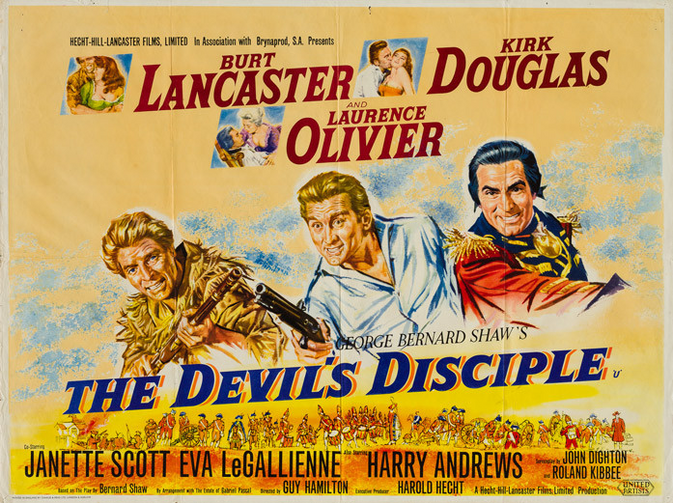Our identities are forged in life yet never by ourselves alone. Whoever you might wish to be, who you actually are in the world is clearly a combination of your own efforts and their acceptance by others. Indeed, to close off one’s identity from others, to resist their contribution in its formation, would be to make one’s self more an actor than a human being, something of an illusion, trying to pass off a self that is no more than a chimera.
It’s difficult to imagine a more confident, capable actor than Laurence Olivier in 1956, the year he signed on to appear in the movie The Devil’s Disciples with the American actors Burt Lancaster and Kirk Douglas. According to Philip Ziegler, his most recent biographer, the man, whose Henry V and Hamlet had already become the stuff of legend, wasn’t easily coached by his comrades.
Privately he admitted that Lancaster, who was coproducer but not director, infuriated him by forever making suggestions as to how he should play his part, the British soldier General Burgoyne. In the end he took Lancaster aside and said apologetically: “I wonder if you could help me. I’m sure I’m being stupid but I’m finding it a little difficult to apprehend what it is you’re trying to say to me. Do me a favor, let’s go somewhere quiet and you read to me the scene as it ought to be done.” Flattered, Lancaster obliged and launched into his rendering, then became self-conscious under Olivier’s quizzical gaze, and came to a stammering halt.
The following year Olivier was reunited with Kirk Douglas in the film Spartacus, a no-expenses-spared epic in which Olivier played a Roman general and Douglas a heroic Thracian slave. This time it was Douglas who took on the role of mentor; again Olivier became irritated, and he invited his costar to give his rendering of the part, again the American broke down in the face of Olivier’s rapt attention. “It was all very shocking and very childish,” Olivier admitted, “but I didn’t care to be taught acting by those two” (Olivier 2014)
Burt Lancaster and Kirk Douglas were not inconsequential talents, but neither was of a caliber to teach Laurence Olivier his craft, a realization that seems to have come over both of them, when he craftily invited them to do so. Olivier’s genius alone would create the character he needed to portray.
But it’s entirely different when the persona we craft is our own identity in the world. That must, of necessity, be done in the company of others, because what we become in the world is the combustible, but ultimately conclusive, combination of our own projection and its acceptance, or rejection, by others.
Even the Christ humbled himself to make inquiry of his identity, asking his disciples, “Who do men say that I am?” In the Godhead, the Father dwells in absolute, incomprehensible mystery. He does not alter, least of all in virtue of our limited perceptions of him. The same is true of the Son and the Spirit, within the Trinity.
But on earth, the Son lowers himself, assuming an identity that is, as much as any other human identity, forged by our acceptance, our reception, however limited, of who he is among us, and, for each of us.
Every human being is a multifaceted identity. Lovers and family members see something of us that a companion at work will never know. Indeed, the graced wonder of committing one’s self to another for a lifetime is the knowledge that facets of the other will never cease to reveal themselves in new situations, new stages of life.
Christ too is a multifaceted mystery. Coming forth from the Father he is one, undivided. Entering into individuals he becomes crystalline, as variegated as the souls who receive him, becoming my Christ, your Christ, a Christ who is still to come because the souls who will receive him have yet to be born. This is the very meaning of salvation and damnation: that the Christ should become magnified in us, or that, through our sinful rejection of him, some portion of this crystalline Christ never forms.
Lawrence Olivier didn’t need Burt Lancaster or Kirk Douglas to teach him how to act. His art did, however, require acceptance by us. A great actor fashions characters who speak to us, creations which become parts, however minute, of our own identity. We grant actors that privilege. We have no choice but to bestow it upon those whom we love. We need their acceptance to become our very selves. Otherwise, we remain nothing more than an illusion. “A poor player / That struts and frets his hour upon the stage / And then is heard no more” (Macbeth V.5.2381-83).
Isaiah 22: 19-23 Romans 11: 33-36 Matthew 16: 13-20








